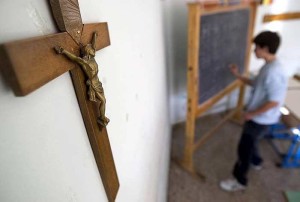
By Susan Gately - 08 June, 2018
 In the context where many people are questioning the value of religious education, a conference in Dublin this weekend is set to show, using empirical evidence, the great value of religious education in the formation of young people.
In the context where many people are questioning the value of religious education, a conference in Dublin this weekend is set to show, using empirical evidence, the great value of religious education in the formation of young people.
The Voices of Young People in Religion and Education: Research, Policy and Impact conference explores new research which gives a voice to young people at post-primary level on religion, education, religious diversity and religious education. It will take place this weekend, 8 and 9 June, in Dublin City University, with registration commencing at 6.00 p.m. this evening.
Dr Gareth Byrne, Associate Professor of Religious Education, DCU Institute of Education, says the conference is for “anybody interested in religious education, diversity, working in Trust boards, religion teachers and school principals at second level”.
The focus point of the conference will be data gathered in both the Republic of Ireland and Northern Ireland, highlighting Catholic, Protestant and other responses to questions relating to religious education.
Dr Byrne will himself address the conference on his own research, which involved a survey of around 3,000 second and third year students in the Republic of Ireland. “One of the interesting findings from my research was that among second and third year students, 85 per cent agree that studying religion in school helps them to understand people of other religions.”
Worship attendance, personal prayer and belief in God are all positively associated with a more positive attitude to religious diversity, he told CatholicIrleland. “The people who do go to church, who gave a positive response on prayer and God were also the people who were most positively aware of and open to religious diversity. Sometimes people would think that wouldn’t be the case,” he commented.
One of the studies being presented at the weekend compares girls in Ireland and Scotland who have no religious affiliation. According to Dr Byrne, female students who claim to have no religious affiliation in Ireland “still consider religion as a matter of some importance to them”. This is not the case in Scotland. “Irish students are still connected to religion in their culture, in their everyday life, much more so than unaffiliated girls in Scotland,” he commented.
Amongst the second and third years, the most significant predictor of church-going is that one or more parents are church-going, and this is even more influential than peer attitudes, the research finds.
“One of the things I’d be afraid of in the future is that people would think that it’d be better not to have any religious education in schools for example, and that it is something that the faith community could look after,” Dr Byrne, who is also a priest of the Dublin diocese, told Catholicireland. “But I think the research indicates that there is an enormous value for these young people, whether they are practising a particular faith or not, in having the space in the school to look at spiritual, moral, religious questions and in fact if that is not provided in the school, where is it provided in their lives?”
The Irish Centre for Religious Education (ICRE), in association with the Mater Dei Centre for Catholic Education (MDCCE), is hosting the conference which will take place in the DCU Institute of Education, Saint Patrick’s Campus, Drumcondra. It is free to attend but registration is required online at https://www.eventbrite.ie/e/voices-of-young-people-on-religion-education-research-policy-and-impact-tickets-45967329520?aff=es2
Presenters will include Professor Jeff Astley (Warwick), Dr Gareth Byrne (MDCCE), Dr Sandra Cullen (ICRE), Professor Leslie Francis (Warwick), Professor Andrew McGrady (ICRE) and Dr Bernadette Sweetman (EQI).